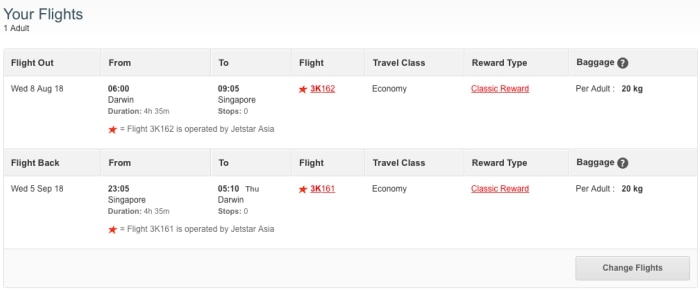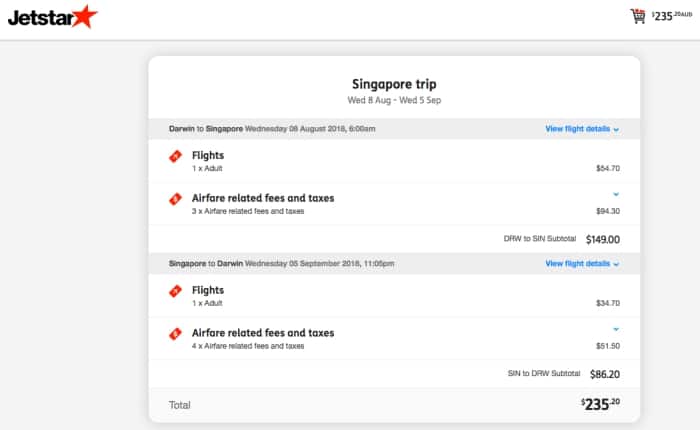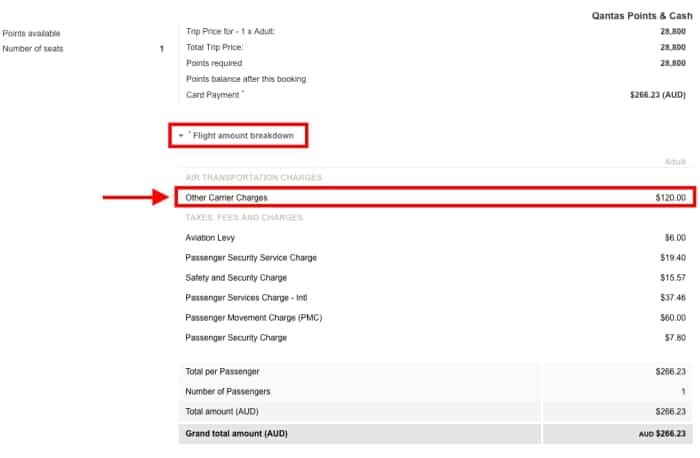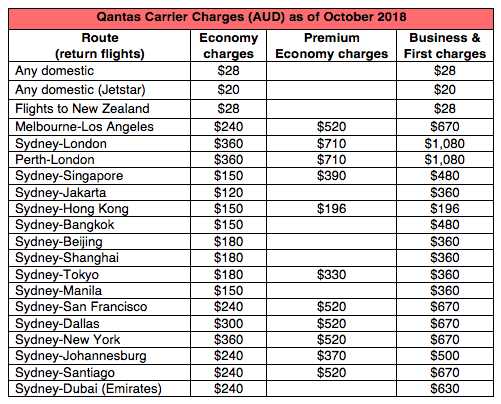The Great Qantas Frequent Flyer Rip-Off

Millions of Australians are Qantas Frequent Flyer members. We collect Qantas points in the hope of one day redeeming them for a free flight. Unfortunately, Qantas Classic Flight Rewards are not as rewarding as the name might suggest.
When redeeming points for reward flights, airport & government taxes must be paid in addition to the points. But Qantas Frequent Flyer also adds its own “carrier charges” on top of this. Qantas carrier charges can add as much as $1,080 to the cost of a round-trip Classic Flight Reward booking, and in some cases these charges are even higher than an equivalent airfare! This is extremely frustrating for frequent flyers trying to redeem their hard-earned Qantas points, especially as carrier charges are not genuine taxes.
What are Qantas carrier charges?
Qantas first introduced fuel surcharges due to rising oil costs in May 2004. At the time, a surcharge of $6 per domestic flight and $15 per international flight was imposed. These amounts gradually increased until July 2015 when fuel surcharges were removed from revenue airfares. But for award bookings made using Qantas points, the airline simply changed their name to “carrier charges”. This charge no longer has any relation to the price of fuel – they’re simply an extra stream of revenue from Qantas Frequent Flyer members redeeming their hard-earned points.
Carrier charges are different to government and airport fees & taxes. All tickets – both paid airfares and award bookings on all airlines – include genuine taxes such as government departure taxes, security charges and airport fees.
In January 2016, Qantas did reduce carrier charges for international Economy reward bookings departing Australia and New Zealand by around 40%. However, carrier charges on premium cabin bookings and flights originating overseas remain unchanged.
Qantas carrier charges vary by origin, route and class of travel
The amount of carrier charges you’ll need to pay when redeeming Qantas points for Qantas or Jetstar flights varies considerably depending on the route, class of travel and origin airport.
On Qantas domestic and short-haul international flights, there is a standard carrier charge of $14 per flight, regardless of the class of travel. But on long-haul flights, the charges vary by route. They can be as high as $540 for a one-way Business or First class award to London, or $1,080 for a return booking. The charges also vary by class of travel, with different rates applied to Economy, Premium Economy and Business/First class bookings. For example, the carrier charges on a return Qantas Classic Flight Reward booking from Sydney to Jakarta in Economy are $120. But if you’re flying Business class, the charges increase to $360.
Much higher carrier charges are imposed on flights departing from certain countries, including the United States. A return Economy reward flight from Melbourne to Los Angeles attracts $240 in extra carrier charges. Yet, when booking the exact same flights from Los Angeles to Melbourne, the carrier charges are an outrageous USD680 (around $875 at today’s exchange rate). After adding on the legitimate government taxes, the total co-payment comes to USD822.04, or $1,061! You can pay for flights on some airlines for less than this – without burning 90,000 Qantas points!
Luckily, it works both ways. Some countries, including Hong Kong, Philippines and Brazil either regulate or ban fuel surcharges. A return Qantas Business class booking from Sydney to Hong Kong or Manila attracts $196 or $360 in carrier charges, respectively. But by booking the same trip in reverse, you’d pay only $62 (ex Hong Kong) or $0 (ex Manila) in Qantas carrier charges.
Carrier charges can be more expensive than the actual fare
It is not uncommon to find that Qantas’ carrier charges are actually higher than an equivalent airfare during Qantas or Jetstar sales. In a recent example that we found, Qantas was charging 28,800 points plus $266.23 in taxes and carrier charges for a return Jetstar flight from Darwin to Singapore.


Yet, the same flights were recently on sale for just $235.20. Admittedly the Qantas award would have included 20kg of baggage, but that’s still an extraordinary waste of 28,800 points.

For this reason, redeeming Qantas points for Economy bookings is often poor value. It pays to check the cost of a regular airfare before redeeming your Qantas points for Economy seats.
Qantas does not publish a list of carrier charges
The ACCC has previously said that airlines are allowed to impose fuel and other surcharges on award flight bookings, as long as customers are not misled. In fairness, Qantas does disclose that fees & charges are payable in addition to the points on Classic Flight Reward bookings. However, Qantas does not publish a list of these carrier charges anywhere. The only way to find out how much you’ll be slugged is to make a dummy booking – and you can only do this online if you have sufficient Qantas points in your account for that booking.
If you do have enough Qantas points in your account, you can view a breakdown of the taxes and charges by clicking on “Flight amount breakdown”. These are then broken down into Qantas carrier charges and other genuine taxes.

How much are Qantas carrier charges?
We’ve put together a comprehensive list of the carrier charges payable on most Qantas routes departing from Australia. Where a route is shared by Emirates, the same carrier charge applies to Emirates award bookings. Note that rates are subject to change.

Why does Qantas still impose carrier charges?
A Qantas spokesperson told Australian Frequent Flyer that carrier charges “reflect amounts determined by the airline that form part of the fare, adjusted and monitored to reflect market conditions and varying demand, and mean the number the points required for Classic Reward seats can remain consistent.”
The Qantas spokesperson added that “Classic Flight Rewards and Upgrades are highly valued by members and they’re the most popular way for them to use their Qantas Points. There are more than 220 partners in the program so there’s lots of different ways members can earn points, which can then be used to make reward bookings and pay for all of or part of the taxes, fees and carrier charges.”
How does this compare with other airlines?
Qantas is not the only airline to impose surcharges on award flight bookings. Emirates, Etihad Airways, British Airways, Lufthansa and Turkish Airlines and many other airlines do the same thing, although Qantas’ surcharges are particularly high on some routes.
Many airlines do not impose any surcharges on award bookings. These include Singapore Airlines, American Airlines, United Airlines, LATAM Airlines and Sri Lankan Airlines. Other airlines, such as Cathay Pacific, impose fuel surcharges but at lower rates.
How to avoid paying Qantas carrier charges
There are ways to avoid or reduce Qantas carrier charges! Apart from booking flights from Hong Kong or the Philippines, another way is to fly with partner airlines that don’t impose fuel surcharges. Read more: Avoiding Qantas Fuel Surcharges on Reward Flights
Another option is to avoid using the Qantas Frequent Flyer program altogether. No surcharges are payable when redeeming American Airlines AAdvantage miles for Qantas flights. Instead of paying 180,000 Qantas points + $635 in taxes & charges for a return First class award from Sydney to Singapore, the same flights would cost only 100,000 American Airlines AAdvantage miles and a more palatable $155 in taxes.
Join the discussion on the Australian Frequent Flyer forum: Qantas Award Charges Outrageous
Community Comments
Loading new replies...
Join the full discussion at the Australian Frequent Flyer →